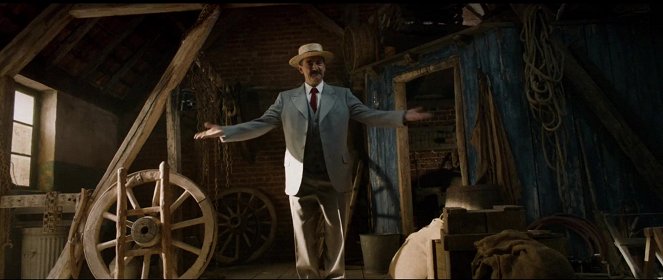Rendező:
Albert DupontelOperatőr:
Vincent MathiasZeneszerző:
Christophe JulienSzereplők:
Mélanie Thierry, Émilie Dequenne, Niels Arestrup, Albert Dupontel, Laurent Lafitte, Nahuel Pérez Biscayart, Frans Boyer, Travis Kerschen (több)Tartalmak(1)
Pierre Lemaitre idehaza is népszerű, Goncourt-díjas regényének adaptációjában a szadista Pradelle főhadnagy (Laurent Lafitte) a háború utolsó óráiban levezényel egy teljesen értelmetlen rohamot a kitüntetés reményében. A két szerencsétlen közkatona, Édouard (Nahuel Pérez Biscayart) és Albert (Albert Dupontel) csaknem az életükkel fizetnek ezért. A vérfürdő maradandó károkat okozott a túlélőkben. Ki-ki a maga módján, de a háború után bosszút esküszik a haza ellen, ami csak a halottakat ünnepli, a megnyomorítottakkal nem törődve. Pradelle a külhonban elesettek hazaszállításából és újra elföldeléséből csinál üzletet, a csatában fél arcát elveszített Édouard, és a számára látványos maszkokat készítő Albert pedig extravagáns emlékmű tervével házalva játszik mások hazaszeretetére. A tét számukra egymillió frank, azonban ha elbuknak, az életükkel fizetnek érte. Erre pedig minden esélyük megvan, ugyanis éppen a legkritikusabb pillanatban tűnik fel újra a pszichopata főhadnagy. (Mozinet)
(több)Recenziók (3)
Albert and Édouard came from radically different social backgrounds, yet they became friends because they met in the trenches of World War I. To fully embrace their misfortune, at the end of the bloody war, they serve under an ambitious and ruthless opportunist who wants to make a name for himself and build his position on the corpses of his subordinates. Unlike their friends, they experienced peace. One of them may be disfigured, the other unemployed, poor, and abandoned, but many others ended up worse off. If you're unlucky, you have to go and find some luck, and that's how the idea arises to take advantage of patriotic euphoria and make a living with a bit of the hypocrisy of the rich and powerful. But the world is never quite big enough that you won't come across those who represent your worst nightmares. See You Up There is, last but not least, a comedy. I hesitate to use the term "dark" because this designation is usually associated with a certain amount of cynicism, and this is not a cynical film. It is a comedy about sad things and human tragedies that you have to deal with and come to terms with. Dupontel's film, however, is much more genre-spanning. During the opening part, it surprisingly functions as an impressive war film that can convey the horrors and despair of World War I in a small space. Above all, it is a visually remarkable film with a special poetics that somewhat reminds one of the work of French colleague Jeunet. Compared to him, Dupontel is more civil, not working so prominently with slapstick or enchanted by camera filters. He is not a showman, but rather he masterfully works with human emotions, and he can move you and evoke catharsis, entertain, and provoke reflection. See You Up There is one of those films that represent a spectacle in the best sense of the word, and any film enthusiast should go to the movie theater to see it. For me, it's worth five stars, and I am convinced that I have seen the best French film of the year. Overall impression: 95%. If I compare it to to Jean-Pierre Jeunet's work, this film also has a weakness for those viewers who prioritize plot over atmosphere, as the poetic atmosphere sometimes takes precedence over the drama and the story.
()
It’s a shame that the French filmmakers didn’t decide to make a pure drama. The theme certainly deserved it and had enough potential for that. Unfortunately for me, they decided to combine drama with comedy and the result was slightly disappointing (hence the one star down). The constant wavering between a serious and a comedic note was getting in the way of the important moment that I was anticipating, namely the opportunity to draw attention to the desperate situation in which many veterans of the Great War found themselves. But despite these reservations, I think it was a good film, and by no means a waste of time.
()
See You Up There is a hard-to-classify anti-war film on the edge between drama and black comedy, which in several aspects feels like a romanticized fairy tale for adults. Both artistically and musically it is an extremely successful work. It is all the more disappointing that the story itself has a few dead spots, which is fortunately at least somewhat saved by the omnipresent poetic atmosphere. (75%)
()

